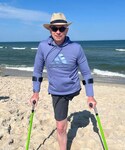
Kris is a husband, father of four daughters, golfer, skier and motorcyclist. He was diagnosed with stage III chondrosarcoma, a rare bone cancer, in September 2020. Three weeks later, he underwent a hemipelvectomy, a major surgery that involved the removal of the left side of his pelvis, his left hip and his left leg. Kris has undergone nine follow-up surgeries and says that surgery was the only solution to his type of cancer.
“My life has been altered completely.” To do daily activities, Kris was fitted for a prosthetic leg and switched to a different car. His diagnosis, surgery and recovery also deeply affected the lives of his wife and daughters, who all had new responsibilities. One of his daughters, now in medical school, assisted Kris in tending to his wounds and managing his physical wellbeing. Another daughter made sure he took his medications at the correct times each day.
Kris and his family all relied on each other while they were coping. He describes his wife and daughters as “cheerleaders.” Once he got fitted for a prosthetic leg, he says that his family “took great joy out of taking videos of me walking.” After his practice, they would debrief together about his technique. He calls his family members “miniature physical therapists.”
Emotional support was also important to Kris and his family. When he was frustrated, his family was there for him. They were also there for each other. His wife became overwhelmed quickly and learned to lean on their daughters. Kris called his family “miniature psychologists,” both for him and each other.
Kris also relied on friends and extended family during his treatment. They would provide meals to his family and manage the house while Kris’s wife was visiting him in the hospital. He found that many relationships were strengthened during this time. One of his cousins helped him shave after being unable to shower for weeks, which brought them closer than ever before.
During his treatment, Kris made new connections. He made friends with the nurses on his floor, who would visit him often. These friendships started out because Kris would hand out snacks that people brought to his hospital room. “The word got around that if you want a snack, come to Kris’s room in the hospital.”
His sense of community was further enriched by support groups. A social worker in the hospital first pointed him to these resources and then he independently searched for them on Google. He found men’s support groups, bone cancer support groups, individual counselors and organizations such as CancerCare. “Without CancerCare, I would have been more lost than I have been. CancerCare has given me a number of insights that I never would have had without their input and has opened my eyes to a whole new world of support, resources and ideas that I never even knew were possible.”
Describing support groups, Kris said, “The people in them are always welcoming and highly supportive and want to do their best to make sure that you have the tools you need in order to be successful.” He has also become involved in the prosthetic community and his prosthetist connected him with others who had experienced similar surgeries.
Kris found many effective ways to cope during his treatment. He thought of ways to provide service to others, which he said was helpful for staying positive. When doctors, nurses and cleaning staff came to his room in the hospital, he would try to brighten their day by telling jokes, asking them about their lives and making them laugh. This was also important when Kris was at home and his family also found opportunities to provide service during their own coping experiences.
Resilience has also been important to Kris. He says that his experience wearing a prosthetic leg illustrates his resilience because he has “fallen down numerous times,” but he always got back up and kept practicing. He thought, “I am going to thrive and even though this hurts, I will not let it get the better of me.” This also applied to his coping experiences in general.
He recognizes the importance that gratitude has in his life. Counselors and therapists greatly helped him in cultivating gratitude. He says, “I’ve been able to see things and possibilities that I’d never seen before.” Writing has also been very helpful in this way. In a support group for post-treatment survivors, he received a gratitude journal with questions and activities that allowed him to record what made him feel happy and grateful.
Kris also started writing a blog as a way to keep his family and friends updated. He would discuss his experiences, both positive and negative, while using humor and connecting them to philosophy that he studied in college. When other people benefit from learning about his experience, he says, “that is one more piece of gratitude.”
